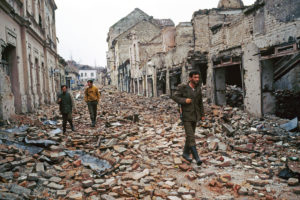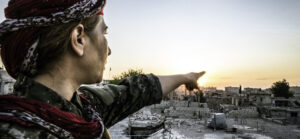A recent BBC documentary promises to take the British viewer “inside” Serbia, exposing the country’s support for the Russian invasion of Ukraine. The language is heightened, evoking Cold War ghosts. “There’s something strange happening in Serbia,” the presenter mutters in hushed amazement. “A shadow hanging over the Balkan nation.” A violinist has inexplicably been commissioned to hang around by a Serbian flag, playing a mournful dirge. The tone connotes that Serbia, like Russia, is a “bad” country, a pro-Putin outpost where a client regime governs a racist, backward population unwilling to relinquish past grievances. The Balkan nation is certainly an outlier in its refusal to join the EU sanctions regime on Russia. But the reasons for this run deeper than mere Slavic solidarity or ethnic chauvinism.
Rather, President Aleksandar Vučić is treading a necessarily complicated line in a vain attempt to appease both Brussels and Moscow, knowing he must soon alienate either his nationalist voter base or the great powers who have him over a barrel. Among Serbs, polling shows that opposition to sanctions on Russia is considerably more likely to be derived from memories of the devastating sanctions imposed on Yugoslavia in the Nineties (44%), as opposed to a vaguer sense that Russia is the country’s “great friend” (24%). A “noisy minority” (21%) do take an unambiguously pro-Russian stance, but the majority of Serbians still back a policy of non-alignment. It may seem clear to many observers that Serbs have an “irrational” and “distorted” relationship with Putin’s pariah state: but to understand why, we must look West as well as East.
The idea that Serbs are mindlessly pro-Putin is immediately complicated by the presence in Belgrade of around 200,000 exiles fleeing Putin’s Russia — doubtless contributing to Vučić’s recent designation of his capital as a modern-day Casablanca, swarming with foreign intelligence assets. Peter Nikitin, the head of anti-war campaign group the Russian Democratic Society, categorises the Russian expat community into three groups: “former activists and political refugees; those who were never active before the war but got so shocked they felt the need to get active; and apolitical, relocated IT people who want to pretend nothing happened”. This third group is the most visible. One local Telegram channel aimed at Russian expats brims with legal advice, job offers, and tips for treating gastritis (with brandy), offering the chance to “chat about life and migration to Serbia — politics prohibited”. Despite such disclaimers, even the relocated digital nomads’ presence here is necessarily political, testing how deep local support for Putin runs.
One set of Russian young professionals frequents Pub 53, a hole-in-the-wall spot owned by another Russian exile. Here, I meet Ana, a software engineer who emphasises the greater freedom of speech and quality of life available here compared to their native Moscow. “No-one can arrest me for my words,” she says. “I’m gay — you see how my friends are — and I’m just here to live my life. There are lots of liberal Russians here, like me.” As these friends arrive, they toast one another with B52 shots mixed with local rakija brandy. The general openness to people like Ana is partly economically motivated, helping to counteract the steady drain of Serbian young professionals into the EU.
Such stories are not universal. Many less educated men of military age grabbed their bags and left overnight for fear of conscription, and now live in hostels or on friends’ couches while they hunt for work. Each morning, a line of young Russian men can be found waiting below a sternly moustachioed statue of Vuk Karadžić, the father of modern Serbia, hoping to be offered cash-in-hand day labour. “The situation is shit,” says Luka, who used to work in a car factory before fleeing the draft. “Many people are going home because there is no work here, only cleaning toilets or deliveries.” But overall, anti-Putin expats have found a home here. While locals complain about (if they do not profit from) soaring rental prices or supermarket-queue etiquette, actual attacks on anti-Putin activists remain rare. “There is a nationalist minority who call us traitors,” says Peter, referring to a recent assault on one activist. “But even if they think we’re weirdos because we’re against Putin, most people are welcoming.”
Anastasija, a Russian psychotherapist and teacher participating in a protest in Belgrade against Russian war crimes, agrees: “Young people here support Ukraine, but many older people support Russia. We’d like to change this, because people don’t have access to information.” Over a year on from the Russian invasion, turn-out at the demonstration is limited — but an opposing, pro-war protest nearby is even more sparsely attended. There, an Orthodox priest fulminates into a microphone, surrounded by a gaggle of protesters brandishing conspiratorial posters: “Serbia will be freed of the servants of the Antichrist”; “Covid genocide”; “Vučić — Will you break the curse of Nato betrayal?” Neither the well-meant humanitarian appeal nor the apocalyptic rant captures the general public mood, with most bystanders hurrying past.
Other concerns are more pressing. Prominent Serbian activist Aida Ćorović, recently arrested for pelting a mural of local hero and convicted war criminal Ratko Mladic with eggs, is coruscating towards her compatriots’ nationalism and “selective memory” over their treatment in the Nineties: “One drug, in the form of the Kosovo myth, was replaced by another drug — that Putin will save us from the ‘hateful’ West.” But she makes no bones about the fact that “the main problem is economic. We are number one in Europe for deaths from cancer, people look for food in garbage containers and fight over meat in Lidl, and yet our citizens believe Vučić’s statements that we live in a ‘golden age’.”
Serbian MP Nebojša Zelenović is the co-leader of Serbia’s green-Left Moramo coalition, which stood alone in backing sanctions on Russia during last year’s general elections. Speaking in the apartment where Yugoslav Nobel Prize winner Ivo Andrić wrote his magnum opus The Bridge on the Drina while under house arrest during the Second World War, he explains that locals are exhausted by lack of service provision, corrupt politicians with fraudulent degrees, scant employment opportunities, and continual brain drain to the West. “There is a strong atmosphere that everybody must be for Russia, and for Putin. At the same time, people don’t believe there is any hope for EU accession. There is no goal, we are going nowhere, and this situation could last for decades.” Serbia’s EU accession has been moving slowly, if at all, since 2009. To Zelenović, the EU is missing an opportunity to use Russia’s increasing alienation to draw Serbia into the fold.
Rather, the EU is using Russia’s increasing isolation to push Serbia into both joining the sanctions programme and make concessions over Kosovo. In downtown Belgrade, a group of men stand around a stall operated by the conservative, nationalist People’s Party, demanding a referendum over the “agreement on the path to normalisation” Vučić this year agreed with Kosovo. As its less-than-enthusiastic name suggests, detail of the agreement remains vague, and practical steps forward a still-distant possibility. Serbia typically counts on Russia to prevent greater international recognition of majority-Albanian, partially-recognized Kosovo. But the EU is now pushing Serbia to agree to Kosovo’s potential accession to the UN, EU and Nato, while offering more protection for Kosovo’s Serb minority in return. Damir Hadžiabdić, who supports the People’s Party campaign against the putative deal, echoes Zelenović’s complaints from the Right: “They don’t give us anything. Just a story of EU accession — but it’s been 15 years with no result.”
Vučić is in a bind. Nominally pro-European, he relies on a nationalist base still smarting from Nato’s 1999 bombing of Serbia, who will turn against him if he is seen to cave to Western pressure. “People in Vučić’s own party don’t support [the deal], but they are scared to admit it,” Hadžiabdić says. “They think the international pressure from the West is huge.” There is a general public belief that only Russia (and China’s) vetoes on the UN Security Council have prevented Kosovo from gaining further recognition, as MP Aleksandar Jerkovic, of Right-wing parliamentary coalition “No Going Back — Serbia Is Behind”, observes: “If you start from the wrong, but widely accepted, point of view that ‘the enemy of my enemy is my friend’, you get a simple answer as to why Russia has so much support.” Putin’s popularity in local polls now outstrips Vučić himself.
The EU has generally seemed satisfied with more cosmetic signs of “reform” (including a failed attempt to hold Euro Pride in Belgrade), while Serbia’s leaders have continued to foster more significant personal and national ties with other powers (Russia’s Gazprom controls Serbia’s only gas import company; in 2021, China saved 10,000 mining jobs). Under Vučić’s premiership, public support for EU accession has dwindled from almost 60% to under a third, showing the failure of the EU’s own investment to create similar political traction, and offering Vučić a convenient excuse for stalled accession talks. EU investment in Serbia actually well outstrips investment from the East, but as Jerkovic explains, a favourable media climate has allowed Moscow to paint themselves as the country’s saviours, while ordinary Serbian people do not see the profits from European investment.
Moreover, as Ćorović indicates, a “constellation” of financial ties still links Vučić’s Progressive Party to Russia: “The party, which was created by Slobodan Milošević with significant support from Moscow, still functions according to the same principles and finds crucial support in the Kremlin.” Vučić therefore faces a Catch-22. Move toward Europe, and face domestic discontent; reject the EU line, and face hard or soft intervention against his rule. “If we make a decision to become part of the West, Vučić will begin to fall,” says Zelenović. “He knows this, so he will buy time, and spend years waiting for [foreign] elections.” Jerkovic echoes this analysis, adding that Vučić’s “pragmatic strategy to buy himself time” will likely last “until the denouement of the Ukraine crisis”, aided and abetted by physical attacks on the media and opposition politicians.
Is there a way out of this impasse? Though wary of the negative impact still more waves of neoliberal restructuring would have on Serbia’s already heavily-privatised economy, progressive opposition figures are generally agreed that closer ties with Europe are necessary to drive reform — particularly on minority rights, the environment, and press freedom. But to Zelenović, Europe’s current approach is all stick, no carrot: “Our voters think the EU forgot us. So what’s the point? If politics just means fighting Vučić, it’s too risky. It would be different if there were hope.”
Jerkovic and Ćorović both condemn Brussels’s willingness to turn a blind eye to authoritarian excesses and non-democratic elections in exchange for security cooperation — resulting in so-called “stabilocracies” where non-democratic regimes are granted external legitimacy , along with the EU’s promotion of extractive mining methods and the brain drain into Europe. “It’s clear to every intelligent Serb that these are double standards. Since the beginning of Serbia’s so-called relationship with the EU, there has been only one topic — what can be taken from Serbia?”, Jerkovic says. As Ćorović puts it, this leaves ordinary people “between the hammer of a radical government and the anvil of European hypocrisy”.
With varying degrees of weariness, and from across the political spectrum, all three observers want the EU to take a more proactive and equitable approach. (“I am sure that British readers are very familiar with… EU praxis,” Jerkovic adds wryly.) Zelenović’s proposals include: a joint EU-accession process for all six Western Balkan states; EU support in exchange for reforms, such as offering agricultural subsidies in return for judicial reform; and exploring the ways Serbia can proactively support the EU — for example by using its historic links with former Non-Aligned countries in the Third World to ease migration into Europe.
The Yugoslav leadership of the Non-Aligned Movement is a reminder that Serbia was not always at the mercy of the great powers. The eponymous Bridge in Andrić’s novel represents Yugoslavia’s unique, strategic location between East and West. And this was the role adopted by Yugoslav President Tito, negotiating between Moscow and Washington to establish his nation as a crucial interlocutor on the world stage, surviving not despite but because of its position between two power blocs. Negative pressure on a country with these historical memories can only go so far. If the West is serious about drawing Serbia out of Putin’s web, it would do well to listen to both Left and Right and offer concrete support for reforms. Absent such measures, it is little wonder its politicians and population will continue trying to steer a third way through troubled waters.
Disclaimer
Some of the posts we share are controversial and we do not necessarily agree with them in the whole extend. Sometimes we agree with the content or part of it but we do not agree with the narration or language. Nevertheless we find them somehow interesting, valuable and/or informative or we share them, because we strongly believe in freedom of speech, free press and journalism. We strongly encourage you to have a critical approach to all the content, do your own research and analysis to build your own opinion.
We would be glad to have your feedback.
Source: UnHerd Read the original article here: https://unherd.com/





